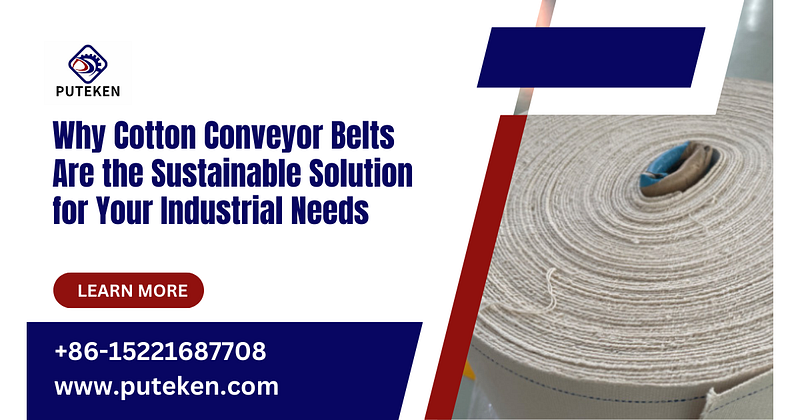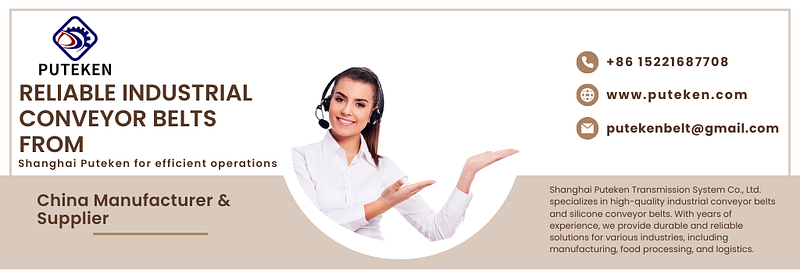Why Cotton Conveyor Belts Are the Sustainable Solution for Your Industrial Needs

In today's rapidly advancing industrial landscape, sustainability has become more than just a buzzword—it’s a core value that companies are embracing to reduce environmental impact, improve efficiency, and enhance their overall operations. One of the areas where sustainability is making a significant impact is in material handling, and cotton conveyor belts have emerged as an ideal solution for industries looking for eco-friendly alternatives to conventional belts. With the growing importance of green manufacturing and sustainable practices, cotton conveyor belts are gaining popularity as a reliable, efficient, and environmentally conscious choice.
A cotton conveyor belt is crafted from natural fibers, combining strength and flexibility to provide optimal performance in various industries, from agriculture to mining and manufacturing. Unlike synthetic alternatives, which may be derived from petrochemical resources, cotton conveyor belts are biodegradable, renewable, and less harmful to the environment. By opting for these eco-friendly options, businesses not only reduce their carbon footprint but also contribute to the development of sustainable practices across the supply chain.
What is a Cotton Conveyor Belt?
Cotton conveyor belts are made from cotton fabric, a natural and renewable resource. These belts are reinforced with layers of cotton fibers that provide strength, flexibility, and durability. The cotton fibers used in these belts are woven or knitted together to create a smooth, long-lasting material capable of withstanding the rigors of industrial operations.
The primary advantage of cotton conveyor belts lies in their ability to combine eco-friendliness with high performance. They are perfect for uses requiring flexible, dependable, and lightweight belts. The cotton material is naturally resistant to wear and abrasion, making it a viable option for industries that involve the transportation of a wide range of materials, from agricultural products to bulk goods.
The Key Benefits of Cotton Conveyor Belts
1. Sustainable and Eco-Friendly
At the heart of cotton conveyor belts is sustainability. Unlike synthetic materials that are derived from petrochemicals, cotton is a natural, biodegradable material. This makes cotton conveyor belts an environmentally responsible choice for companies committed to reducing their environmental impact.
By using cotton conveyor belts, companies help minimize the accumulation of plastic waste and contribute to a cleaner, more sustainable planet. The production process of cotton is also generally less harmful to the environment, especially when compared to synthetic alternatives, which require more energy-intensive processes and contribute to pollution.
In addition, cotton conveyor belts can be disposed of more easily at the end of their lifespan, as they are biodegradable. This ensures that your business’s impact on the environment is minimized throughout the belt’s lifecycle.
2. Durability and Reliability
Despite being a natural material, cotton conveyor belts are designed to endure heavy usage in industrial settings. The inherent strength of cotton fibers provides an excellent level of durability, ensuring that these belts can withstand the demands of many industrial applications.
The cotton construction offers a high level of abrasion resistance, allowing the belts to maintain their integrity even when subjected to harsh environments. This durability reduces the need for frequent replacements, helping companies save money on maintenance and downtime. Whether you're handling bulk goods, agricultural products, or light materials, cotton conveyor belts can offer a reliable and long-lasting solution.
3. Cost-Effective
Another significant advantage of cotton conveyor belts is their cost-effectiveness. Cotton is generally less expensive than synthetic materials like PVC or rubber, which means that businesses can achieve lower operational costs by opting for cotton conveyor belts. Furthermore, the durability of cotton means that these belts require less frequent replacement, further contributing to overall savings.
With rising operational costs, especially in industries that rely heavily on material handling, choosing a cost-effective yet high-performing solution is essential. Cotton conveyor belts provide just that—offering businesses the best of both worlds: performance and cost-efficiency.
4. Versatility Across Applications
Cotton conveyor belts are adaptable and suitable for a variety of applications. From agriculture to manufacturing and food processing, cotton belts are ideal for conveying light to medium-duty materials. Their flexibility allows them to be used in both horizontal and inclined conveyor systems, providing smooth and consistent material transfer.
These belts are particularly popular in environments where the handling of delicate or non-abrasive materials is required. For instance, in the food processing industry, cotton conveyor belts are used for transporting items like grains, fruits, and vegetables, ensuring that products are not damaged during transport.
Additionally, cotton conveyor belts can be customized to meet specific operational needs. Whether it’s adjusting the thickness, surface texture, or coating of the belt, customization options ensure that these belts are optimized for different applications and environments.
5. Low Maintenance and Easy to Repair
Another noteworthy benefit of cotton conveyor belts is their low maintenance requirements. While all conveyor belts require some level of upkeep, cotton conveyor belts tend to require less maintenance compared to synthetic alternatives. The cotton material is easy to clean, and its ability to resist dirt and grime helps keep maintenance needs at a minimum.
Moreover, cotton conveyor belts can be easily repaired when necessary. Since cotton is a flexible material, small tears or damages can often be fixed without requiring a full replacement, which further contributes to their cost-effectiveness and durability.
6. Biodegradable and Easy Disposal
When the time comes for the belt to be replaced, cotton conveyor belts have a significant advantage over synthetic options: they are biodegradable. This means that at the end of their lifecycle, they won't contribute to long-lasting waste in landfills. Rather, they can decompose organically without causing environmental damage.
This makes cotton conveyor belts an excellent choice for companies looking to implement sustainable waste management practices. By choosing a biodegradable option, businesses contribute to reducing their ecological footprint and ensure that they are adhering to eco-friendly policies.
7. Chemical and Temperature Resistance
Cotton conveyor belts are naturally resistant to a wide range of temperatures and chemicals, making them suitable for use in various industries where exposure to harsh conditions is common. Whether you are dealing with high temperatures, mild chemicals, or oils, cotton conveyor belts provide a high level of resistance, ensuring they perform well under challenging conditions.
The inherent properties of cotton fibers also make these belts a good option for environments that require a balance of durability and flexibility.
Applications of Cotton Conveyor Belts
1. Agriculture and Farming
In the agricultural sector, cotton conveyor belts are widely used for the transportation of produce, grains, and other farm products. Their ability to handle delicate items without damaging them makes them a go-to choice for farms and food processing plants. Additionally, they can withstand the harsh conditions often found in agricultural environments.
2. Food Processing
Cotton conveyor belts are commonly used in food processing facilities where hygiene is a top priority. Their smooth, easy-to-clean surfaces ensure that food items can be transported safely without contamination. These belts are ideal for handling grains, vegetables, and other food products in an environmentally friendly manner.
3. Mining and Bulk Handling
In mining and bulk handling applications, cotton conveyor belts are used to transport materials such as coal, sand, and gravel. The strength and durability of cotton fibers ensure that these belts can withstand the rough and abrasive nature of bulk goods.
4. Manufacturing and Assembly
In manufacturing environments, cotton conveyor belts are ideal for light-duty material handling tasks. Whether it's transporting parts in assembly lines or moving goods between different stages of production, cotton conveyor belts offer a cost-effective and reliable solution.
Cotton conveyor belts are quickly becoming the sustainable choice for industries looking to improve their environmental impact without sacrificing performance or reliability. By opting for cotton conveyor belts, businesses not only enhance their operations but also contribute to a greener future.
From their eco-friendly, biodegradable nature to their versatility and durability, cotton conveyor belts offer a wide range of benefits for industries across the globe. At Shanghai Puteken Transmission System Co., Ltd., we are proud to offer top-quality cotton conveyor belts that meet the specific needs of various industries. By investing in cotton conveyor belts, you can improve your efficiency, reduce costs, and align your business practices with sustainability goals.
FAQs
- 1. Are cotton conveyor belts suitable for all types of industrial applications?
Cotton conveyor belts are best suited for light to medium-duty applications. They excel in industries like food processing, agriculture, and light manufacturing.
- 2. How durable are cotton conveyor belts?
While cotton conveyor belts are durable, they are best suited for environments that do not involve heavy-duty, abrasive materials. They are designed to last for several years, reducing the need for frequent replacements.
- 3. Can cotton conveyor belts be customized?
Yes, cotton conveyor belts can be customized in terms of thickness, surface texture, and coatings to meet the specific requirements of different applications.
- 4. Are cotton conveyor belts environmentally friendly?
Yes, cotton conveyor belts are made from natural, biodegradable materials, making them an eco-friendly alternative to synthetic belts.
- 5. How do cotton conveyor belts compare to synthetic options?
Cotton conveyor belts are more environmentally friendly and cost-effective than many synthetic options, while still offering good durability and performance in suitable applications.




Comments
Post a Comment